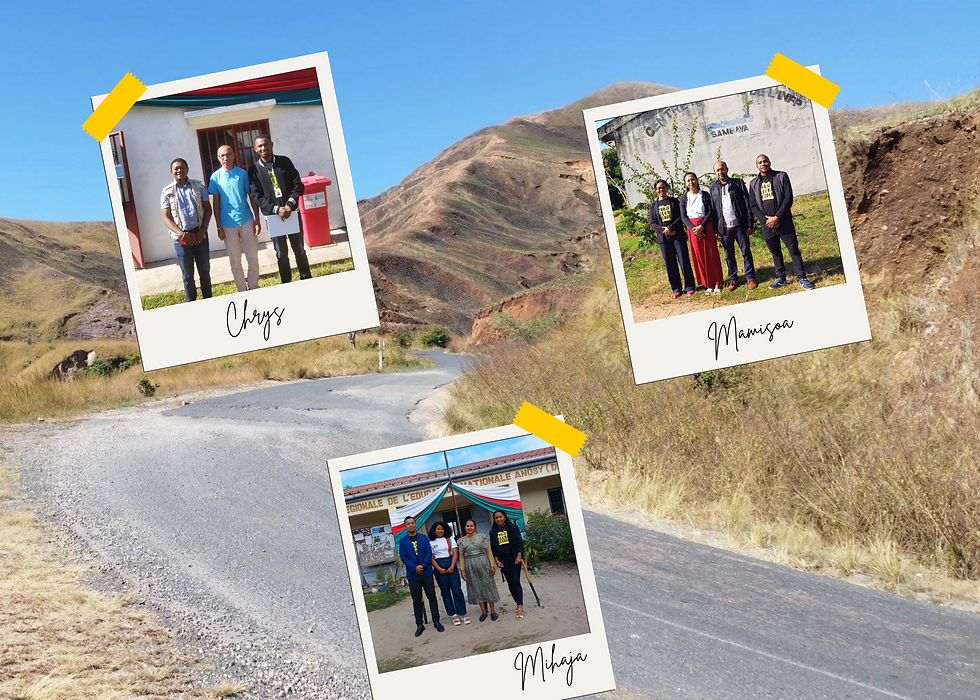Enhancing the Capacities and Resiliency of Violence Response Service Providers
- Projet Jeune Leader

- 28 janv. 2024
- 4 min de lecture

Violence against women and children is prevalent in Madagascar, with many forms intersecting during adolescence. The Ministry of Population and Social Services — the government branch charged with providing violence response services — has been a long-time partner of ours in the Haute Matsiatra region. Since our very first CSE Educators began working in 2013, we have referred youth who share experiences of violence with us to violence response specialists at the regional Ministry office. It’s given us a first-hand look at how tirelessly these individuals work to support survivors — and the challenges they face in being able to effectively meet the needs of their clients.
Over the past few months, with support from the Australian Embassy’s Direct Aid Program, we’ve been able to partner more closely with service providers from the Ministry of Population in Haute Matsiatra region. Together, we’ve been working to enhance the capacities and resilience of our respective teams to support survivors of violence, especially children and adolescents.
Strained Violence Response Services
Adequate support for survivors of violence is scarce in the Haute Matsiatra region of Madagascar where we work. The system relies on the goodwill of a handful of violence response specialists — the only source of legal, medical, psychological, and material government help for survivors. Yet, these staff work in resource-constrained conditions, and few have received the professional development needed to deliver basic violence response services.
“I saw staff members providing shelter in their own homes to survivors of violence who had nowhere else to go,” shares Saraha Randriamorasoa, a clinical psychologist we engaged as a consultant on the project. “It’s just one of many examples of how these individuals care deeply about their clients, and how insufficient resources in the system aggravate their personal risk and high stress. It’s not surprising that we then see a breakdown of personal and professional boundaries, high emotional distress, burnout, a sense of powerlessness,...”
At the start of the project, Saraha conducted a participatory needs assessment with district-level violence response specialists across the Haute Matsiatra region. As she immersed herself with teams across six districts, she found a number of recurring challenges.
Unsurprisingly, many of the service providers reported feeling demoralized and exhausted after years of working on traumatic cases. Few had received any training on how to care for their own mental health and define boundaries between themselves and their clients. These pressures are compounded by staffing shortages and a lack of physical resources (e.g., confidential meeting spaces, emergency food and shelters for survivors, etc.).
Critically, many staff had not received adequate initial training or ongoing professional development. In her observations and interviews, our consultant psychologist noted that more survivor-centered approaches were needed.

Enhancing Service Providers’ Capacity and Resiliency
With a list of priority areas for capacity development co-identified with local service providers, our consultant psychologist Saraha designed a multi-pronged approach to not only to build providers’ clinical skills, but also to enhance their socio-emotional wellbeing as they work in extremely challenging conditions.
Saraha and PJL’s Research, Learning, and Accountability Coordinator, Tahiry, facilitated a three-day workshop for 16 staff from the Haute Matsiatra Ministry of Population focused on human- and survivor-centered approaches. Participants shared, discussed, and learned (and unlearned!) about topics like trauma, adolescent and child psychology, mental health and well-being, setting limits and boundaries, self-care and emotional intelligence.
The workshop had a transformative impact, even as it could only scratch the surface of complex issues in a short amount of time. “I have worked at the Ministry of Population for 34 years, and this is the first time I have learned about these concepts,” shared an Assistant Director at the Ministry of Population. Another frontline worker later explained, “The workshop gave me new principles to apply to my work, especially regarding boundaries. Setting limits and boundaries has helped my do my job and not be emotionally drained.”
In the weeks following the workshop, Saraha provided one-on-one coaching to a subset of participants. This included shadowing sessions with clients (with permission), then conducting in-depth debriefings with the service providers. These coaching sessions highlighted a number of priorities for further capacity development that have taken place in smaller group workshops over the past few months.
“It was encouraging to see many of the service providers applying the approaches we had discussed in the initial workshop in their individual practice,” shares Saraha. “I started to see some improvement in their listening skills and emotional regulation over the course of the process, although I could see how draining and challenging this change process was.” Ultimately, as Saraha underlines, “It’s imperative to recognize that change is a long-term process that requires constant and consistent effort.”

Strengthening a Response & Support Ecosystem
This effort has put into stark relief the challenges faced by the individuals responsible for upholding the violence response system. We were glad to support these critical local partners to improve aspects of their professional development and wellbeing — which, in turn, has a huge impact on the lives of their clients. At the same time, we recognize that structural reforms and investments are needed to realize a functional system.
In the meantime, we continue working to strengthen young adolescents’ support ecosystems at the local level, notably by establishing better referral pathways between our CSE Educators and service providers — doing what we can within a constrained context to help youth access support in their most vulnerable moments. Learn more in our second story about this effort!
This effort was made possible with generous support from the Australian Embassy’s Direct Aid Program.



